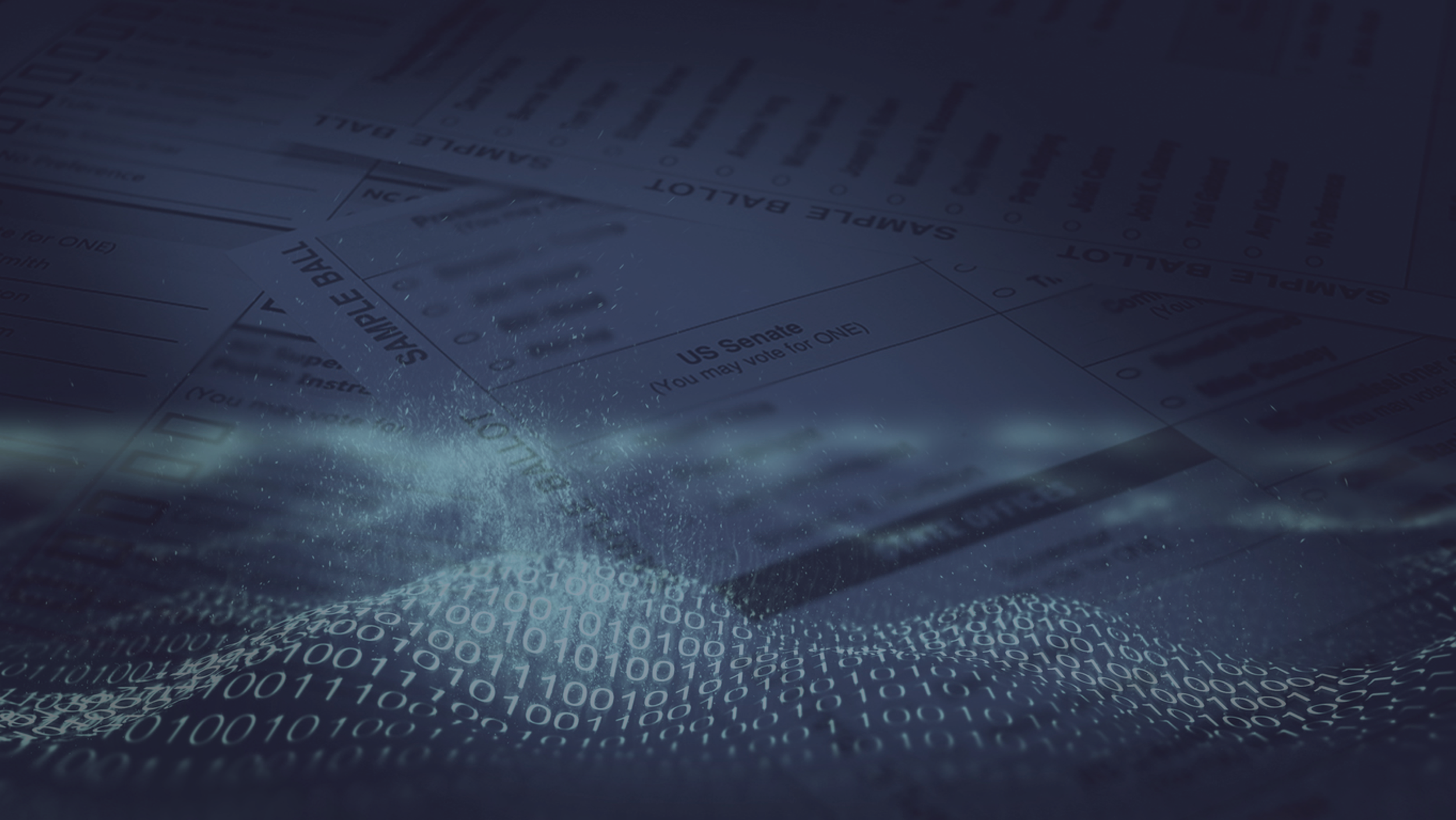News & Insights
We’re Making History in Real Time.
Our timely insights share informed perspectives on the rapidly evolving story of Election Technology, as it unfolds.

Mistakes Are Not Malfeasance – It’s Important to Know the Difference
Protecting democracy means that it’s essential to properly distinguish between “honest mistakes” and more nefarious conditions that could impact election outcomes. Particularly given the speed at which information travels through social media, if voters and the media are not circumspect, they may unwittingly spread mis- or disinformation. Here are some tips to consider…

Who Should Make an Elections AI Service Agent? (Part 6)
In this final installment of how to build an NLA (a domain-specific or DS-NLA) — the how informing the who question (that we started with back in mid-Dec ‘23) — I focus on what may be the most overlooked set of questions about how a system should be built — not just for serving users, but supporting it’s operators…

Who Should Make an Elections AI Service Agent? (Part 5)
In the previous (4th) installment in this series, we pivoted from the question of who can or should build Chatbots, to the challenge of How to build a safe, low-tolerance, domain-specific natural language agent (NLA or “DS-NLA”). This time, we assume for the moment that challenge is tractable and explore the question, “What else is required, in addition to a safe base model?”…

Who Should Make a Voter AI Chatbot? (Part 4)
After an extended holiday break from my last installment on the question: “Who should make a Chatbot for voters?” — I’m back for the 4th installment in this series. This time, I’m pivoting from the Who question to the How question; and I have definitely pivoted from “Chatbot” to “domain-specific natural language agent” (NLA)…

Who Should Make a Voter AI Chatbot? (Part 3)
After two installments on the question: “Who should make a Chatbot for voters?” — we’ve come down to 3 observations:
Elections is an area of very low tolerance for inaccuracies, hallucinations, and repeating falsehoods.
It’s a terrible idea to build a so-called “lightweight Chatbot” app on top of the existing services powered by current LLMs from the AI tech-titans.
It’s not a good idea for any of those tech-titans to use their expertise and resources to tinker with their own LLM to be a specialized info service.
So then, given what needs to be built, we can finally consider who in the hec can (or should)…

Who Should Make a Voter AI Chatbot? (Part 2)
In the previous installment of this series, I gave a simple answer of “Nobody!” to the question of who should build a voter Chatbot. The reason was simple: the typical Chatbot is equally simple — and fatally flawed: a thin veneer of web (or App) user interface on top of an application programming interface (API) that connects over the Internet to a massive computing complex run by tech titans. and that’s only the beginning of the challenges…

Who Should Make a Voter AI Chatbot?
One of the side effects of the AI frenzy this past year is that lots of people are talking about the idea of having an AI-powered ChatBot for their favorite thing. Election-land is not immune to this desire. Like everywhere else, the idea is more-or-less similar: “Wouldn’t it be great if we could wave a magic wand and have an Oracle appear that is safe and reliable to answer any question about my favorite topic?” Well as the old saying goes, “Not so fast there, my friend”…

Towards an AI Research Agenda for Elections and Beyond (Part 3)
This is the 3rd of three posts of a 4-part series on responsible domain-specific AI research. Last time, John posted his 2nd part of this longer commentary about the AI research agenda that’s necessary for elections specifically, and a lot of government usage generally. Having explained the particular needs of use in election administration, this time he offers clarity about the needs for government computing and/or public-benefit generally.…

Towards an AI Research Agenda for Elections and Beyond (Part 2)
This is the 2nd of three posts of a 4-part series on responsible domain-specific AI research. Last time, John focused on a couple of prerequisite points relevant to the general idea. This time he delves more acutely into AI-driven “domain specific” natural language agents (NLAs), starting with usage in elections…

Towards an AI Research Agenda for Elections and Beyond (Part 1)
In this, first of three posts of a 4-part series, CTO John Sebes examines the AI needs in election technology. He focuses his remarks on text-based generative AI, the technology behind “chat-bots” and other kinds of natural language agents (NLAs). There’s plenty to say about AI more broadly, but NL AI is the tech that can meet important needs in human assistance, specifically NLAs that are “domain specific”…

The Basics About the Walled City of Election Administration
Our readers and followers may recall this tweet thread we posted in late November about where votes are counted and stored and how exactly basic voting systems function. The Trump Administration’s persistence of a false narrative about election rigging (“stop the steal”) shows no sign of letting up in the waning days of his presidency. So, it’s time to debunk these claims with an easier to follow explanation (a fact-based narrative) rather than continuing a whac-a-mole approach of pointing out each of the many falsehoods as they pop up, and individually responding. So, OSET Institute co-founders John Sebes & Gregory Miller offer a simple article about what is actually true…

Election 2020: The Most Secure Ever...
Recently, we read Eric Tucker’s and Frank Bajak’s article about the assessment that this election was " the most secure" in American history. (The statement is captured here if the current Administration has removed it). However, we must not believe that “the most secure election” means that there is no further need for government funding or innovation in the existing election technology infrastructure, or that we can just let the status quo remain. We cannot…

Vote By Mail: A Pragmatic Response to a National Election Hit by COVID-19
As the U.S. battles the spread of COVID-19, expanded Vote-by-Mail is a feasible pragmatic method to help protect the operational continuity of democracy administration and to avoid dangerous disruptions to constitutionally mandated national elections.

House Hearing on Election Security Broaches Supply Chain Issues
The Committee on House Administration, the committee with oversight responsibility for matters relating to federal elections, is holding a hearing today entitled “2020 Election Security: Perspectives from Voting System Vendors and Experts.” The CEOs of the three voting machine makers (Election Systems & Software, Hart InterCivic, Dominion Voting Systems) are providing written testimonies, two of which include statements about supply chain risk. Supply chain risk management is a timely topic.

The Case for Mobile App Voting: Can We Know the Risks to the Whole Election?
In a recent InformationWeek Dark Reading article, Kelly Jackson Higgins asks whether Internet voting by mobile app is better than other forms of Internet voting, based on better security. Rewinding to the beginning of this series: my response is, “No, App based mobile voting isn’t preferable to other forms based on security.” However, it might be preferable to other methods based on voter convenience, but there are many other factors...

National Security and “Federal Control” of Elections
Previously, our CTO, John Sebes tried to unpack the regrettable misunderstanding that current attempts to strength U.S. elections nationwide are some form of Federal hijack of states’ responsibilities for elections. And of course, he is not our corporate lawyer or anyone in Legal trying to sort this out. But from a layperson’s view (at least to Constitutional law and all) this doesn’t seem overly complicated to John, and so here’s his view....

“The Federal government should not gain more control over state elections” — Exactly Right, and Missing the Point
While at DEFCON Voting Village this week, OSET Institute CTO John Sebes observed that there is clearly more energy, more concern, and a greater sense of patriotism about defense of democracy and securing our elections than he has yet to see. And that has John thinking about how the federal government and states’ governments need to cooperate for the benefit of our democratic republic. John comments here, and in a follow-up post.

Straight Talk About Election Security Plain Talk
On June 21st the House Administration Committee held a Markup Session for HR 2722 the SAFE Act. We monitor as much of these proceedings as we can. And this one in particular compelled our CTO John Sebes to not only produce a Paper clarifying or correcting several assertions made by a House Member during that proceeding, but also led to a 7-part “plain talk” series on election security posted on our TrustTheVote Project blog. In this post here, John explains why…

The Internet and Elections: Clarifying the Conversation
With the report of comments pouring into the U.S. EAC on the next generation of the Voluntary Voting System Guidelines, and all of the coverage of the issue about the role of the Internet, we feel compelled to try to simplify and straighten some things out. Even recent EAC Hearings have left the issue a bit unsettled and unclear. So, below I try to clarify where things stand as of now in hopes of clarifying the conversation about what is or isn’t.

Microsoft Wades into Election Integrity & Security with New Open Source Software Tools
The primary short-term significance of the Microsoft announcement about ElectionGuard (similar to the recent DARPA SSITH open source trusted hardware project) is validation of a major point about election cyber-security that just wasn’t part of the national conversation a couple years ago: Major technology innovation is required to increase the verifiability, accuracy, and security of elections technology and (at least) U.S. elections. That’s probably just as important as the prospect that ElectionGuard might be included in future proprietary voting system products, or in open-source election technology offerings from OSET Institute’s TrustTheVote Project or others….
